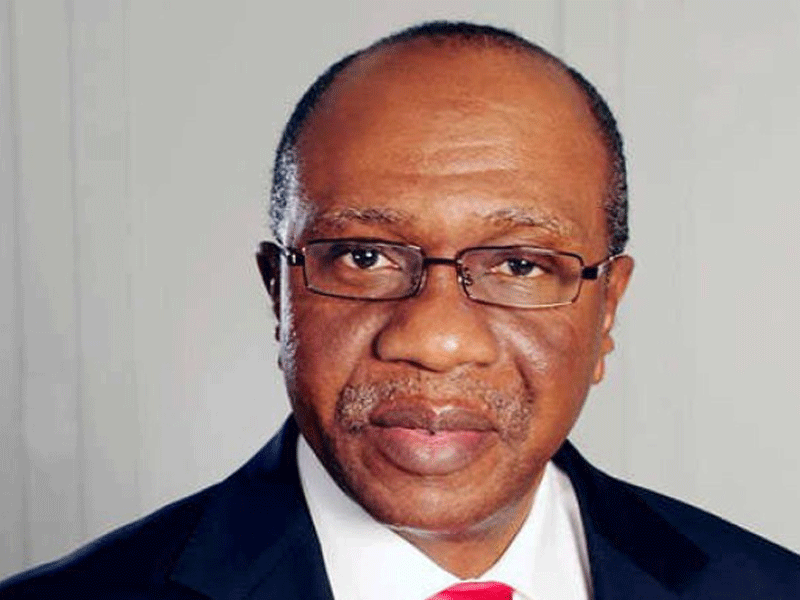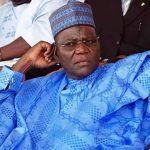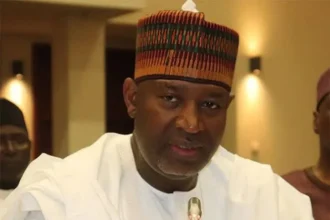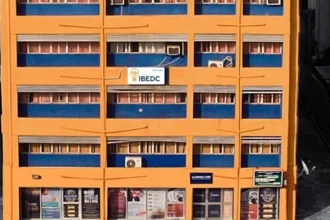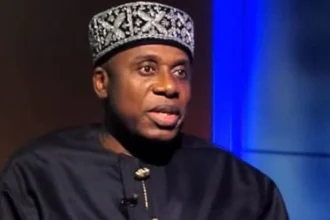...To get all news updates, Join our WhatsApp Group (Click Here)
Also Join our WhatsApp Channel (Click Here)
…says ex-CBN gov sold banks without payment evidence, recommends lenders’ forfeiture to FG
Report reveals how former apex bank boss approved interest-free loans for cronies
The report of the special investigation into the activities of the Central Bank of Nigeria has accused the immediate past governor of the apex bank, Godwin Emefiele, of using ill-gotten wealth to acquire banks for himself through proxies.
According to the report, Emefiele used proxies to acquire Union Bank of Nigeria for Titan Trust Bank Limited, as well as Keystone Bank without any evidence of payment.
As a result, it recommends that the Federal Government should reverse the sale of the banks and also take them over.
The special investigator, Jim Obazee, had on Wednesday submitted the report of his investigations into the acquisition of Union Bank and Keystone Bank to President Bola Tinubu in two separate letters dated December 20, 2023.
This is coming on the heels of findings by the investigator that Emefiele illegally lodged billions of naira in public funds in no fewer than 593 bank accounts in the United States, United Kingdom and China without the approval of the apex bank’s board of directors and the CBN Investment Committee.
Obazee found out that the ex-CBN governor lodged £543,482,213 in fixed deposits in UK banks alone without authorisation.
Emefiele, who is currently in the Kuje Custodial Centre, is being prosecuted for N1.2bn procurement fraud.
Obazee, who was appointed special investigator in July, submitted his final report tagged, ‘Report of the Special Investigation on CBN and Related Entities (Chargeable offences)’ to the President on Wednesday.
He had earlier submitted an interim report on the probe of the CBN and related entities on December 9.
In his letters to the President, Obazee said he had completed his investigation into the illegal acquisition of Union Bank by Titan Bank, and was on the verge of recovering the two banks for the Federal Government.
He stated in his letter to the President, “When we carried out the investigation, we discovered that some persons were used as proxies by Mr Godwin Emefiele to set up Titan Trust Bank and acquire Union Bank therefrom, all from ill-gotten wealth.
“We were able to secure some documents and investigation reports will lead to the forfeiture of the two banks to the Federal Government. We have completed our investigation on this acquisition and have also held meetings with the relevant parties except for Mr Cornelis Vink, who is currently hospitalised in Switzerland.
“Otherwise, we are on the verge of recovering these two banks for the Federal Government.”
During the probe into the UBN acquisition supervised by the Emefiele-led CBN, Obazee explained that he requested the apex bank to furnish him with the details of the deal.
Findings indicate Titan Trust Bank sought the CBN’s no-objection to its proposed consolidation with UBN, excluding its United Kingdom operations via a letter dated October 25, 2021.
In the letter, TTB stated that the consolidation was being contemplated in four phases via acquisition of 91.5 per cent of the issued shares of UBN; mandatory tender offer for the remaining UBN shares; buyout of any share that were not voluntarily sold to TTB on the MTO; and merger of TTB and UBN with UBN as the surviving entity.
The TTB letter also stated that the consolidation was to be funded via a combination of debt and equity.
The CBN in a letter dated March 9, 2022 granted no-objection to TTB’s requests to obtain a $300m facility from Afrexim Bank as well as capital injection of $175m from two existing shareholders of TTB, Luxis International DMCC and Magna International DMCC.
The TTB, via a letter dated June 3, 2022, informed the CBN that it made the payment of the purchase consideration to the selling shareholders on June 1, 2022, and thus completed the acquisition of 93.41 per cent of the issued shares of UBN.
According to the investigator, the TTB sought approval for the mandatory takeover of the remaining 6.59 per cent of UBN shares vide a letter dated October 14, 2022.
The MTO was reportedly triggered by the successful acquisition of 93.41 per cent of the UBN shares and TTB was granted a no-objection to acquire the remaining 6.59 per cent shares through a letter dated October 24, 2022.
On November 2, 2022, the TTB officially launched the MTO, offering to acquire the remaining shares and the MTO concluded with the TTB purchasing an additional 0.64 per cent of the issued shares of UBN, thus bringing its total shareholding to 94.05 per cent.
To approve a scheme arrangement between itself and the holders of the balance of 5.95 per cent shares not yet bought by the TTB following an order of the Federal High Court, the UBN convened a meeting on June 13, 2023.
This was expected to result in the transfer of the outstanding UBN shares to TTB.
The investigation report noted, “The process to acquire the remainder of 5.95 per cent of the issued share capital of UBN by TTB is ongoing through a court-ordered scheme of arrangement between itself and the holders of the balance of 5.95 per cent.
“TTB stated that its ultimate objective is to acquire 100 per cent of the total outstanding shares of UBN.”
Further investigation showed that TTB is owned by Luxis International DMCC and Magna International DMCC, said to be based in Dubai, United Arab Emirates.
The two firms were said to be owned by Vink Corporation Middle East FZC, which is controlled by Cornelis Vink.
However, efforts to verify the corporate status of Luxis and Magna in Dubai failed as they did not have a physical presence in the Arab country as claimed.
“This contravenes Section 3(5) of the Banks and Other Financial Institutions Act, 2020. Accordingly, they are not supposed to be allowed to operate or acquire a bank in Nigeria,” the report declared.
It stated, “The special investigator probed the activities of the TTB and discovered that there is a mysterious shareholder who has given interest-free long-term loan to (with no fixed repayment schedule) to the entities mentioned above (Luxis International DMCC and Magna International DMCC). This mysterious shareholder is believed to be Mr Godwin Emefiele.
“The special investigator requested the supposed owner of TTB and ultimate acquirer of Union Bank of Nigeria, Mr Cornelis Vink, to submit proof of funds, internationally verifiable bank statements (from incorporation of the entities to date), and the shareholder that gave interest-free loans to the two entities separately, names, nationality, source of fund, proof of fund, bank statements) as well as relationship of the entities with Mr Andrew Ojei, Jerome Shogbon, Rahul Savara, Winston Odeh, Adaeze Udensi, Ekene Louis, Godwin Emefiele, Macombe Omoile, Tunde Lemo, Mudassir Amry, Faruk Gumel, Oluremi Oni, and Vink Corporation Middle East FCZ together with the details of the shareholder that also gave Vink Corporation interest-free loan and your good self.
“A letter came from Union Bank of Nigeria claiming he is sick and can only come to meet with the special investigator or submit the documents requested when he gets well by the end of September 2023. As of today, December 20, 2023, we are yet to hear from him nor receive any of the requested documents.
“We are informed that they want to seek a political solution. The special investigator is of the view that the TTB and UBN be recovered by the Federal Government, strengthened and sold in the nearest future.
“A meeting was initially scheduled for December 5, 2023, with the Board of Directors of the two banks by the CBN Deputy Governor for Financial System Stability to close out discussions on this matter. The meeting has been postponed.”
On the alleged acquisition of Keystone by Emefiele through proxies, the investigator explained that sometime in 2017, the Asset Management Corporation of Nigeria moved N20bn to Heritage Bank and on the back of that, the bank granted N25bn loan to the promoters of Isa Funtua/Emefiele Group’s acquisition vehicle to buy Keystone Bank and the loan was further backed by the shares of the bank.
Upon acquisition, Keystone reportedly returned the N20bn to Heritage Bank as placement and Heritage thereafter repaid AMCON from the cash flow so created.
The report read in part, “When the loan granted by Heritage Bank to Isa Funtua/Emefiele’s acquisition vehicles matured with outstanding balance, the MD of Heritage Bank, which was then in serious liquidity crisis, called for repayment. Unfortunately for the shareholders of the bank, the Funtua/Emefiele group could not repay.
“Consequently, the MD of Heritage Bank got his lawyers to write to the bank on two occasions threatening to take over Keystone Bank based on the shares they had pledged as security.
“After much pressure from him, Keystone Bank created internal loans of about N50bn between June and October 2019 and moved the proceeds to repay Heritage Bank on behalf of the shareholders.
“Before this, Godwin Emefiele as governor of the central bank had mounted pressure on the bank for these loans to be created within Keystone Bank on behalf of their group.
“However, the MD of the bank at that time resigned due to the consistent pressure from him and the shareholders to comply.
“The next in command, the deputy managing director, who subsequently became the acting MD, also resigned within three months for the same reason.
“Thereafter, an executive director, who then became the acting MD, took his vacation to avoid pressure for the approval of the loans. Unfortunately, the GM, Risk Management (Mr Tijjani Aliyu) and GM, Corporate Banking (Mr Niran Olayinka) approved the loans (about N50bn) while he was away and moved the proceeds to Heritage Bank for the repayment of the shareholders’ loans. The above loans, which are not being repaid currently, have total outstanding balance in excess of N64bn.”
The investigation also found that the credit approval memoranda were passed by the two GMs to the bank’s chairman, Alhaji Umaru Modibbo, who gave the final approval for disbursement, adding that the process bypassed the Management Credit Committee, Board Credit Committee and full board before disbursement.
“As a reward, the two GMs were immediately appointed executive directors, while one of them became the MD over the acting MD, who used to supervise him. The internal loans so created are not being serviced and have gone bad,” Obazee submitted.
The investigator informed the President that he had commenced the interrogation of the AMCON managing director on the acquisition of both Polaris and Keystone banks besides Arik Air, Aero Contractors and financial reporting by AMCON.
The AMCON MD was said to have told the investigator that “the N898bn liquidity support into Polaris Bank is not part of the SPA, which it should” and that “the N50bn paid for the transaction by the preferred bidder is not received by AMCON.”
Obazee said a preliminary review of the case showed that “Keystone was acquired for free as did Polaris Bank and the special investigator should liaise with the CBN to recover these two banks to the Federal Government of Nigeria.”
Counsel for Emefiele, Matthew Bukkaa, SAN, could not be reached for comments on the allegations levelled against his client.
He had yet to reply to a message sent to him on the matter as of the time of filing this report.
You can get every of our news as soon as they drop on WhatsApp ...To get all news updates, Join our WhatsApp Group (Click Here)
Also Join our WhatsApp Channel (Click Here)



